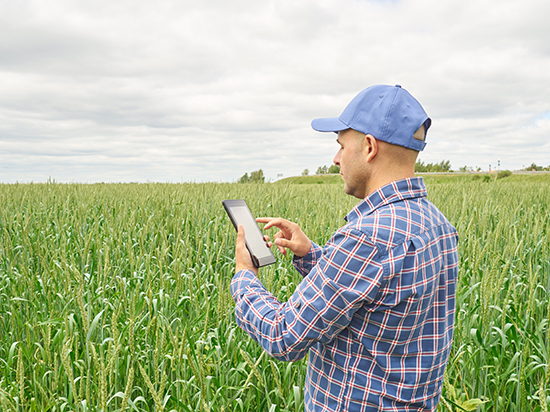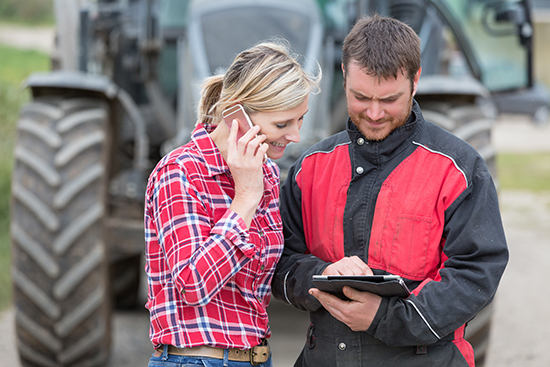It’s 2018, and Ag Week is upon us once more. Agriculture continues to change at an alarmingly quick pace, and that leaves the public with more questions than answers. Thankfully, our local, well-educated farmers and ranchers are on top of those changes. So we’ve taken the time to sit down and interview a couple of local experts from Junction City, KS to see if we could get a few answers to some of our burning questions.
 Central National Bank: What do people absolutely need to know about technology and the way it’s changing agriculture?
Central National Bank: What do people absolutely need to know about technology and the way it’s changing agriculture?
Expert 1: “Everything is so much more exact with technology. Farmers weren’t exactly guessing before, but chemical and seeding rates are much more exact today than they have ever been.”
Expert 2: “We’re having as great a technology advancement today as we were in going from the 1920s and horse-drawn equipment, to the mechanical equipment of the 1950s and 60s. In the 1990s, we started to really see greater technological advancement that has evolved farming operations. We’ll continue to see those changes for maybe another ten years. In fact, we’re probably five years out from having autonomous equipment in fields on a regular basis.”
Expert 1: “Maybe not in rural Kansas just yet, but certainly in other parts of the country.”
Is there a specific technological innovation that you consider to be especially pivotal for agriculture?
Expert 2: “The release of global positioning satellites from the military into a civilian environment in the late 1980s. That and micro-processing – the ability to get sensors and equipment sizes down. You know, it’s the same reason we’re carrying around these smartphones when it used to take a whole room full of computers.”
Expert 1: “For example, we’re going to have auto-calibration added to our combine, so it’ll auto-calibrate the crop’s yield within 2-3%. That’s something that I’ve done by hand for years. We record all of the information and then do a post-harvest calibration to compare to the weigh-tickets. So it’ll be more efficient and much more exact in the future. When doing the calibration by hand, we can be anywhere from 10-15% off.”
Expert 2: “Expert 1 can speak more to this, but there’s also genome editing which has changed things considerably. The only thing we can’t really control is the weather.”
Expert 1: “Yeah, for example, doing something like taking the gene of a petunia and putting it into the soybean seed for resistance to certain pests or for gaining drought tolerance has been a big advancement. We’re able to get a higher yield and feed more people as a result of that.”
 As technology in agriculture has advanced in the past 25 years, and continues to advance, how does education look different? For example, kids used to be able to grow up and take over the family farm, and they didn’t need to get a college degree to do so. How has the industry changed in that regard?
As technology in agriculture has advanced in the past 25 years, and continues to advance, how does education look different? For example, kids used to be able to grow up and take over the family farm, and they didn’t need to get a college degree to do so. How has the industry changed in that regard?
Expert 1: “Our equipment dealerships put out training all the time and there is accessibility to more information online. We also go to specialized training for pesticide usage. In order to use pesticides, you have to be licensed and continue to get re-licensed every so many years. So, in addition to learning in school about things like genome editing, and calculating crop yield, and all of the other science and math-related information you need, there’s ongoing training after school.
Expert 2: “The education of the consumers is just as important as the education of our farmers, too.”
Expert 1: “I agree with that. There’s a lot of misinformation out there in places on the internet and in the media, and not all of it is truthful. People have a tendency to read an article and then automatically believe it, versus doing more research to learn the truth.”
Expert 2: “We try to advocate for more education and information across the board. We don’t want the perception to be that farmers are tinkering with the food supply and don’t understand the science behind it. There’s a lot of research that goes into every adjustment that’s made, and every new innovation. We also want to make sure our elected officials have an understanding of what’s happening. Here in Kansas, somewhere around 85% of the economy is driven by ag and ag-related fields. Entities like Farm Bureau and Geary County Ag Day are how we choose to help advocate.”
In your opinion, what are some pros about the way technology has changed agriculture? What about the cons?
Expert 1: “One of the biggest pros is that you can reduce your input costs or control them a little bit more. You know what you’re putting down and where it’s going, and then what fertilizer is being applied, and in what quantities. For instance, if you have a hillside and one side is rocky, and the other side is more fertile, you know that you can calculate the planting so the side with the rocks will have a lower population of seed applied. Meanwhile, the other side of that hill can be a higher population and have a resulting larger yield. You’re not just putting down seed or fertilizer that’s going to be wasted. The only con I can think of is the fact that we’re attached to our phones so much more.”
Expert 2: “Every so many years there’s a different technique that comes around to improve our processes. It used to be that no-till was the new thing. That’s the idea that mother-nature doesn’t till the ground, so why should we? Then we came around to the idea of having cover crops. If you go out into a native pasture, the cropping system changes, and it’s continually evolving. So, cover cropping is the idea that if we take a crop off, we should replace it with something else for one of the following purposes: either to help amend the soil, provide nutrients or save moisture. Now we have the idea that if you also rotate livestock into the field, there’s a whole other opportunity that arises with that. The only con that I can think of is that our grandparents probably knew every inch of every acre of ground that they farmed. They could tell you where every rock lay and they knew the land forwards and backwards. Because we can now cover things more effectively and more efficiently with autonomous equipment, I think we’ll become more and more removed from the soil itself. It’s the same concept of having social media to communicate with friends and relatives. You lose the face-to-face aspect, and while there’s good and bad to both options, it’s important to find a balance.”
Expert 1: “We have the introduction of drones now too, and while you can fly a drone over a field and collect data via thermal imaging, sometimes if you’re walking in the field you can see things that you couldn’t see with the drone.”
What should people look for in the future? Do you have any predictions?
Expert 2: “My personal prediction? Remember the replicators on Star Trek? You could punch a button and say “I want a cheeseburger” and it’d create one. I think we’re looking at that in the future – maybe even in ten years. We already have 3D printers that print prosthetics and clothes and stuff that is made up of starches. I think proteins will be just around the corner, and from there it’s just a short distance to producing a machine that can take a bag of starch, a bag of protein, of sugars, fats, and some type of flavoring and spit out a meal based on your selection.”
Our experts are multi-generation family farmers. For more information about crop production, farming and ranching techniques, or other changes in the agricultural field, they would encourage you to get to know a farmer or rancher near you. Talk to them, get to know them and gain a better understanding of where your food comes from.
